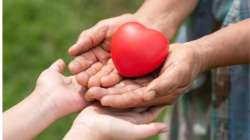Delhi: Declared brain dead, 6-year-old boy gives life to 2 other children at AIIMS
The child was declared brain dead following a head injury.

New Delhi: The family of a six-year-old boy, who was declared brain dead at the All India Institute of Medical Sciences here, has given a fresh lease of life to two children by donating his organs. The child was declared brain dead at 10.11 pm following a head injury.
The child had suffered a severe head injury after being hit by a two-wheeler on April 15 and was admitted to AIIMS Trauma centre in an unconscious state with evidence of severe brain damage. Following counselling, the family gave consent to donate the organs. Kidneys and liver were successfully transplanted into two children.
Fifth paediatric donation
This is the fifth paediatric donation (in the 1-6 years of age group) amongst 19 donations to have taken place at JPN apex trauma centre, AIIMS, here since last April.
Dr Deepak Gupta, Professor of Neurosurgery at AIIMS, Delhi said, “Children are a very special group and need targeted approaches for brain death certification, maintenance of donor organs after brain death, subsequent organ retrievals and transplantations.”
There is a large unmet need for organs by children suffering from end-stage diseases of the kidney, liver and heart across India and training of doctors in transplants in children needs to be reinforced at regular intervals. "Incidentally, 6-year-old Master S was born with only one kidney (as was confirmed on CT and USG abdomen) and hence only one kidney was retrieved to be transplanted to another boy at AIIMS Delhi, while liver was transplanted at ILBS to another 16-year-old boy in Delhi as per allocation by NOTTO," Dr Gupta said.
National Organ & Tissue Transplant Organisation is an organisation set up under the Directorate General of Health Services of the Ministry of Health and Family Welfare.
Dr Gupta further said that both corneas retrieved by the RP Centre Eye bank team will be used to give new vision to patients in need at AIIMS in subsequent days and the heart valves were also retrieved for later usage. However, the heart and lungs were not found to be suitable for transplantation by a team of experts from NOTTO.
Dr Aarti Vij, Head of ORBO at AIIMS said, “The entire process of brain death certification, donor organ management and counselling for consent and further retrievals was coordinated by a team of doctors, paramedic support staff from the Organ Procurement team (OPT), Organ retrieval banking organisation (ORBO) of AIIMS, transplant team of doctors and support staff from the hospital.”
Challenges of organ donations from very young donors
Talking about the challenges involving organ donations from very young donors, Dr Gupta said the biggest myth amongst many is that organ donations can be done only between the 18-60 years of age group. He said that the organs can be harvested for donations after a patient has been declared brain dead irrespective of age.
For a patient, a set of two tests by a team of four doctors are conducted 6 hours apart in adults and 12 hours apart in children, giving new life to an average of eight patients after due informed consent by relatives of the patient. "It is true that many neonatal donors are too small to recover organs for transplantation (especially those younger than a year), finding suitable recipients in such young donors can be a challenge too.
Donations and subsequent successful transplantations have been reported from India even in children younger than 1 year of age," he said.
(With PTI inputs)
Also Read: Soldier donates brain dead wife's bones to AIIMS Delhi for transplantation